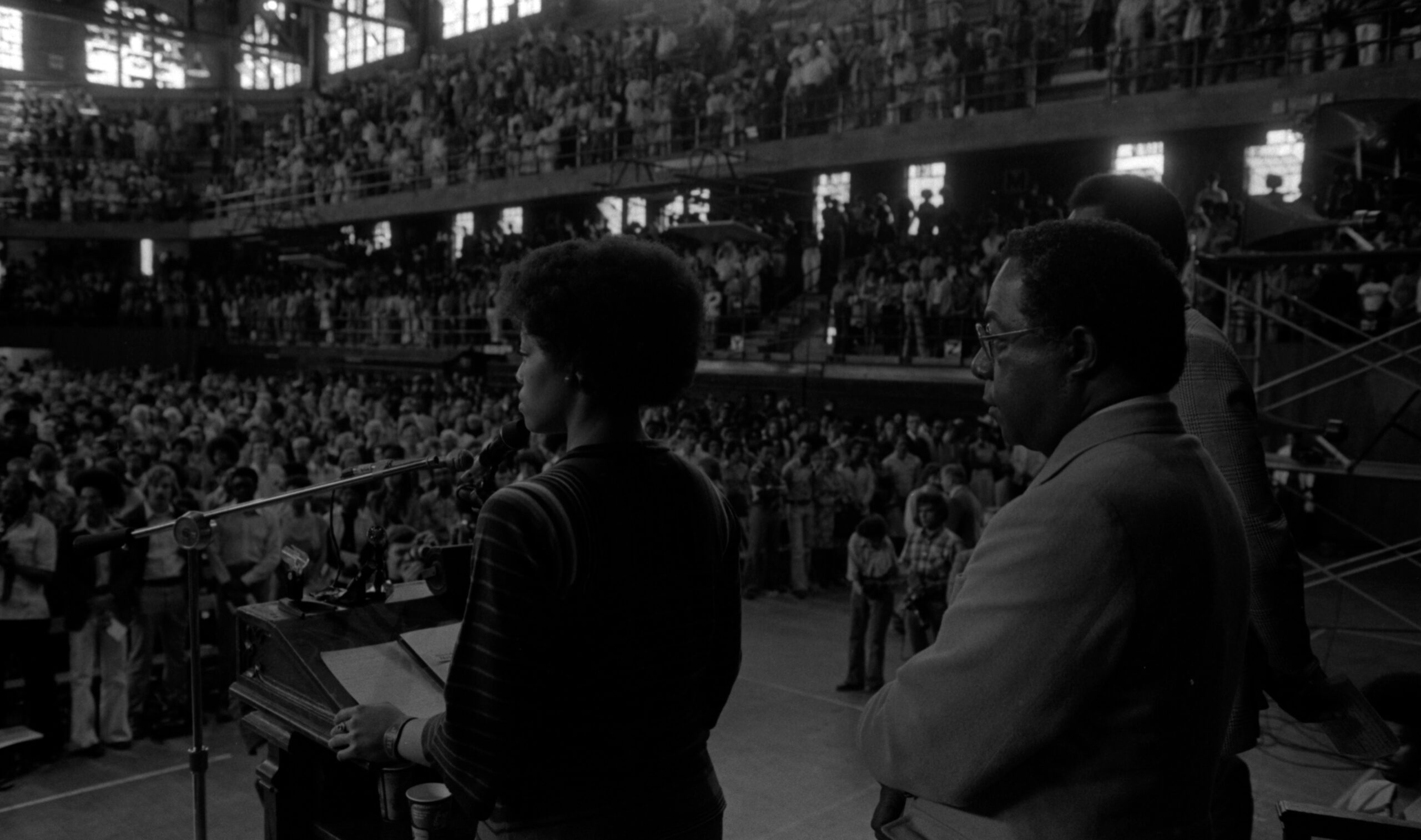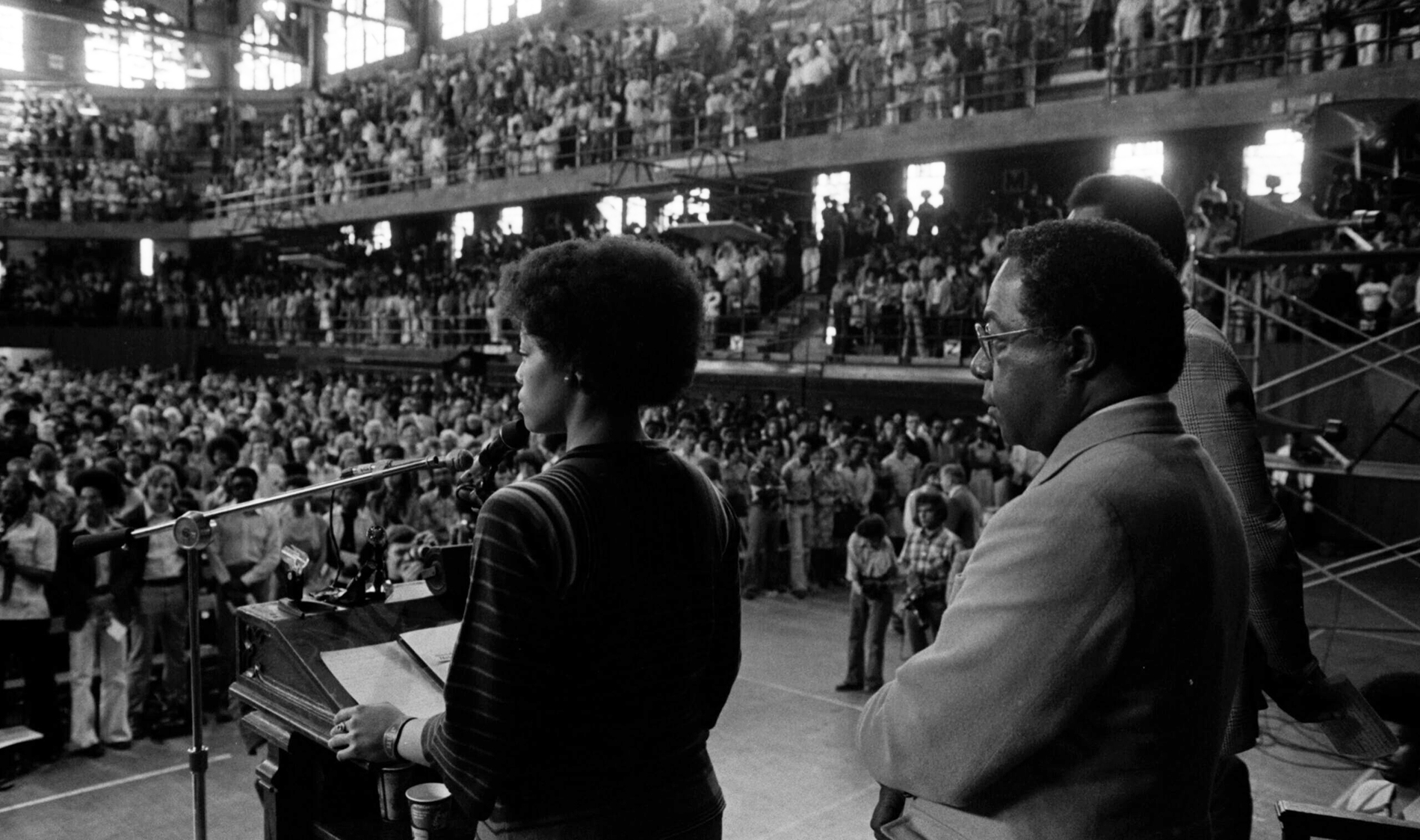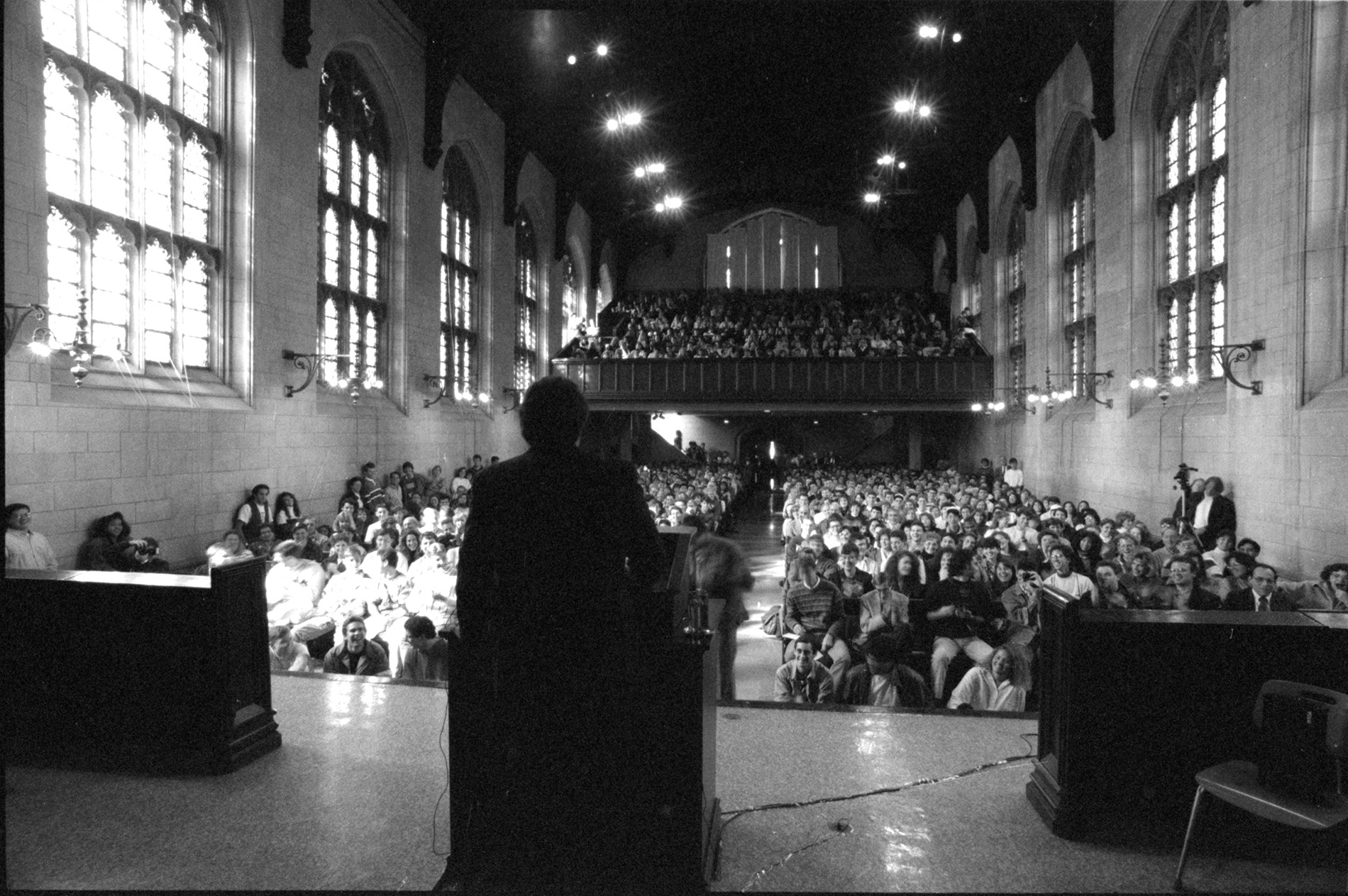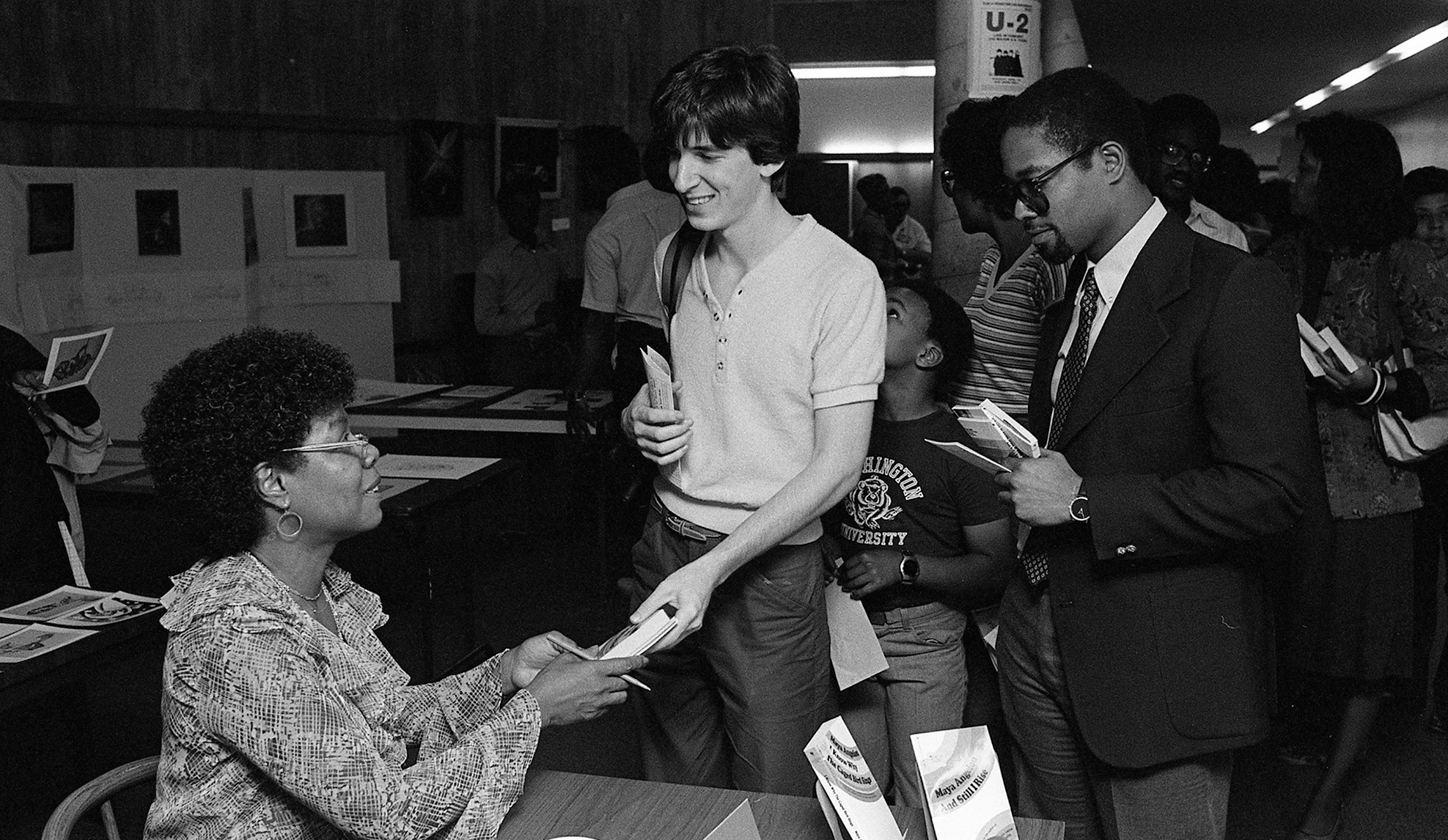
Recorded Voices Digitized and Revived: Assembly Series Lectures
Numbering in the thousands, recordings of the Assembly Series Lectures in University Archives were recently digitized for access by students and other researchers. The Washington University Libraries were awarded a $34,520 grant from the Council on Library and Information Resources (CLIR) to fund the project, “Echoes of Voices Past: Preserving the Public Lectures of Washington University’s Assembly Series.” The grant was awarded as part of CLIR’s Recordings at Risk initiative, which seeks to preserve at-risk audio and visual recordings.
Since 1953, the Assembly Series at Washington University has hosted talks by some of the most prominent figures of the twentieth and twenty-first centuries, including Nobel laureates, Supreme Court justices, scientists, artists, and performers. A revered tradition at the university, the Series has featured addresses by the likes of Shirley Chisholm, Francis Crick, Maya Angelou, Harold Ramis, and Rita Mae Brown, to name just a few.
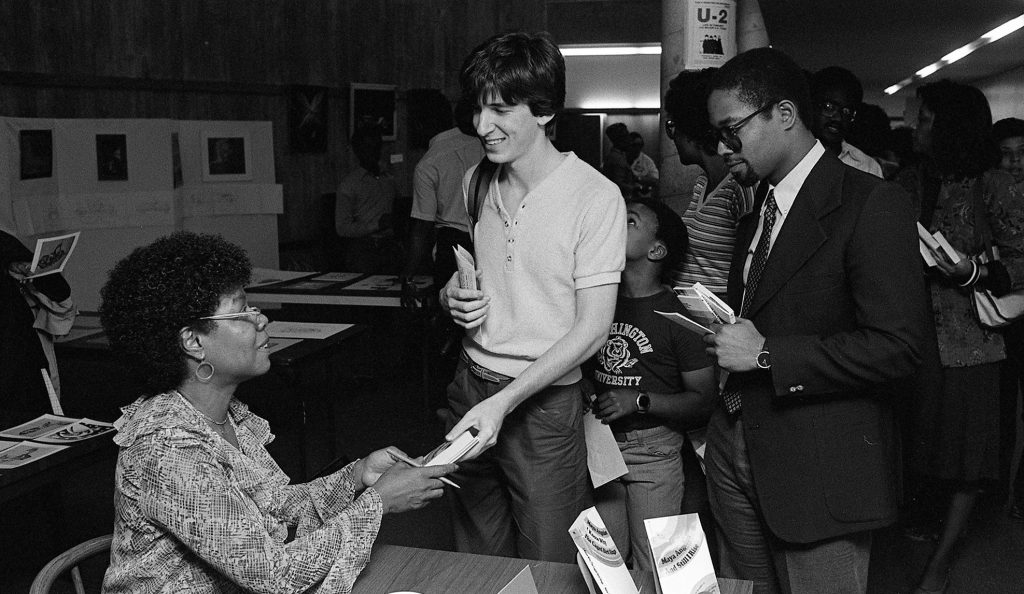
The Film & Media Archive successfully digitized over 1,400 audio recordings of Washington University’s Assembly Series and some older lectures, ranging from 1949 to post-2010. This makes the majority of the lectures available to the public for the first time.
Over the years, a few recordings were available for access in different formats: audio cassette tape, CD and, more recently, MP3 files. However, most recordings were inaccessible and, if requested by a patron, the process of digitization for a single lecture could take up to several weeks in addition to significant costs.
Preserving Important Voices
Digitized by Preserve South, a vendor specializing in audiovisual digitization in Georgia, over a period of one year, the audio recordings amounted to nearly 700 reels of ¼ inch tape and 800 cassettes. The tapes were in better condition than anticipated, according to Tyler Bequette, film preservationist at the Film & Media Archive, making it possible for a portion of the grant to be used toward digitizing even more Assembly Series recordings than initially planned.
But as with most magnetic media, a number of ¼ inch reels were invariably affected by acetate deterioration known as vinegar syndrome. There was also physical damage to some of the cassette cartridges requiring rehousing.
Bequette, who first encountered the Series recordings three years ago during Olin Library renovations, found lots of inconsistencies in the documentation of the Assembly Series from one decade to the next. He worked on creating a new structure and metadata for the project as a whole. Along with the original collection finding aid, these efforts laid the foundation for a meticulous aggregation and cataloging of the reels, cassettes, and digital files of the lectures in multiple formats within the Libraries system, to enhance their ability to be discovered and used over time.
Additionally, the tapes were moved from cardboard boxes into archival containers early on to ensure long-term preservation. “The rehousing was a big effort to get them into polypropylene archival boxes with proper airflow so that they are no longer sitting in cardboard boxes that are not acid-free. There were a small portion of reels that suffered from vinegar syndrome and were no longer usable and they had to be separated from the other items,” said Bequette.
When the files came back from the lab, Digital Archivist Jim Hone worked on audio quality control, comparing the preservation copy of a lecture with the new MP3 file to ensure metadata compatibility. Hone’s process was to make corrections and update missing information on both the access and preservation copy of each title in the metadata spreadsheet.
“The important thing is to make sure to catalog every bit of information related to the lecture. I have spent as much as an hour trying to figure out who is speaking and if we already happen to have a record of it. I make sure the lecture matches with the metadata we have on the spreadsheet and then make changes where it doesn’t.”
Some of the difficulties arose from older audio recordings where the tape had been reused several times. Lectures dating back to the 1960s and 1970s and earlier were often haphazardly combined with several other recordings on reel -to-reel audio tape. In other instances, the recordings suffered from other technical flaws such as very low volume, tape hiss or an incomplete lecture, making it often challenging to identify the speaker or other categories of information.
While Preserve South creates digitally accessible files from audio recordings, it doesn’t check for overlapping recordings or other technical issues that need further adjustments. This entails crucial alterations and even, on occasion, the creation of entirely new files by the digital archivist.
A digitized lecture by the novelist Martin Amis, for example, ended with an indecipherable voice. Speeding up the recording by three times, Hone discovered that it was a snippet of another recording and was able to excise it from the access MP3 copy. “I leave the preservation copy alone. We never try to change that. But I was able to remove it from the access copy that we are going to share with the public.”
The successful digital transformation better preserves and increases public access to an important archive. University Archivist Sonya Rooney said, “I am so thankful we received the grant and have such great staff to see the work through. It is exciting to have all these valuable lectures where we can finally easily share them with researchers.”
While the majority of the work was completed by summer 2022, an extension of the grant will be used by the Film & Media Archive and University Archives to digitize a number of VHS tapes, DVDs and 8mm tapes of the lectures by the fall. Learn more about and access the Assembly Series Collection.
An online exhibition this fall, Echoes of Voices Past: Preserving the Public Lectures of Washington University’s Assembly Series, highlights a number of Assembly Series speakers—fifteen in total (with audio excerpts)—the collection, and the grant. In addition, a one-hour virtual event at 4 pm (CDT), November 3, will focus on the impact Assembly Series has had on the WashU community across the years. Henry Schvey, professor of drama; alumnus Rob Wild, AB ’93, associate vice chancellor for student affairs, dean of students, and chief of staff; and others will share memories of the Assembly Series, and the grant’s importance will be discussed.
Read Preserving a University Tradition in Washington Magazine.
